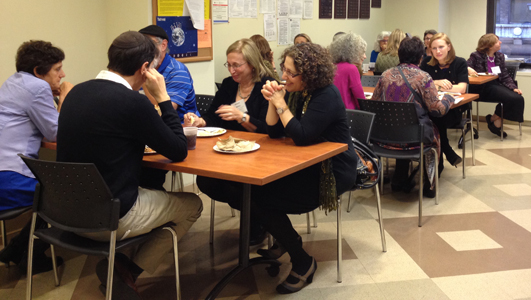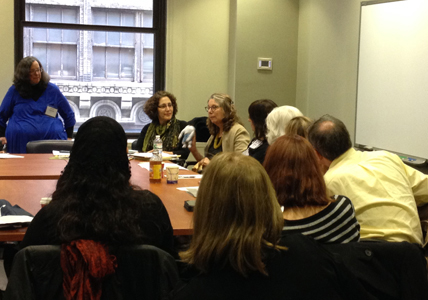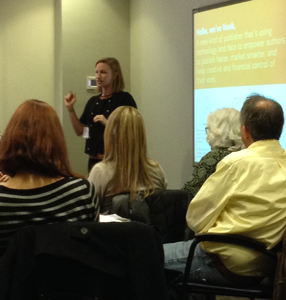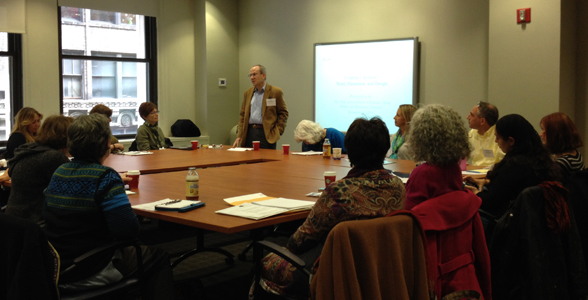Join a community of readers who are committed to Jewish stories
Sign up for JBC’s Nu Reads, a curated selection of Jewish books delivered straight to your door!
Posted by Nat Bernstein
The 16th Annual Jewish Children’s Book Writers & Illustrators Seminar was held on Sunday, November 2nd at the Jewish Book Council offices in New York City. An intimate gathering of 30 or so authors and artists spent a full day workshopping and learning about different facets of children’s book publishing.
 Book designer, artistic director, and children’s author Claudia Carlson kicked off the seminar with a keynote speech about her personal trajectory climbing the ropes in a very difficult industry. Claudia’s tenacity — necessary for any aspiring illustrator, designer or writer — immediately struck and resonated with her audience: unable to find the kind of work she desired upon entering the publishing world, Claudia enrolled in as many workshops and courses as her schedule allowed, took jobs in departments she had never considered before, and spent her lunches browsing bookstores to “research” how other designers approach books. “A good book cover will make someone pick up a book already asking a question—but none of it can make up for bad writing,” she observed.
Book designer, artistic director, and children’s author Claudia Carlson kicked off the seminar with a keynote speech about her personal trajectory climbing the ropes in a very difficult industry. Claudia’s tenacity — necessary for any aspiring illustrator, designer or writer — immediately struck and resonated with her audience: unable to find the kind of work she desired upon entering the publishing world, Claudia enrolled in as many workshops and courses as her schedule allowed, took jobs in departments she had never considered before, and spent her lunches browsing bookstores to “research” how other designers approach books. “A good book cover will make someone pick up a book already asking a question—but none of it can make up for bad writing,” she observed.
 Claudia named Uri Shulevitz’s Writing with Pictures as the ultimate resource for illustration and book design, and recommended taking calligraphy courses to sharpen one’s eye across the page. Book covers are more about typography and design than art — Claudia recalls a former mentor repeating, “Stop illustrating the cover!” over her drafts — and the interiors have to be set to match the stories they contain. “Good book design is like a table setting,” Claudia quipped, “people should remember the food and conversation, not the plates. A good designer illuminates the words and pictures, never overpowers them.”
Claudia named Uri Shulevitz’s Writing with Pictures as the ultimate resource for illustration and book design, and recommended taking calligraphy courses to sharpen one’s eye across the page. Book covers are more about typography and design than art — Claudia recalls a former mentor repeating, “Stop illustrating the cover!” over her drafts — and the interiors have to be set to match the stories they contain. “Good book design is like a table setting,” Claudia quipped, “people should remember the food and conversation, not the plates. A good designer illuminates the words and pictures, never overpowers them.”
 Seth Fishman and Shira Schindel followed with a split presentation on researching and querying literary agencies and exploring e‑publishing options. Seth, a literary agent and current JBC Network author, offered earnest advice on finding the right agent — “An agent works for you: if you’re with the wrong agent it can really burn your career. You want to find a partner in your agent; editors, publishers come and go, but agents take their clients with them wherever they end up.” — and outlined the optimal query letter. Seth has noticed a “direct correlation between research and quality of writing,” observing that authors who have clearly put in the time to learn about the agencies their querying and the industry in general ten to prove the better writers in the “slush pile.” Shira, who heads acquisitions for Qlovi, heartily agreed with Seth on the importance of making a strong impression from the slush pile, mentioning that most firms assign interns to sort through all query letters for standouts. She discussed the advantages and drawbacks of e‑publishing and digitally-enhanced books, comparing different sites and sources — and their terms.
Seth Fishman and Shira Schindel followed with a split presentation on researching and querying literary agencies and exploring e‑publishing options. Seth, a literary agent and current JBC Network author, offered earnest advice on finding the right agent — “An agent works for you: if you’re with the wrong agent it can really burn your career. You want to find a partner in your agent; editors, publishers come and go, but agents take their clients with them wherever they end up.” — and outlined the optimal query letter. Seth has noticed a “direct correlation between research and quality of writing,” observing that authors who have clearly put in the time to learn about the agencies their querying and the industry in general ten to prove the better writers in the “slush pile.” Shira, who heads acquisitions for Qlovi, heartily agreed with Seth on the importance of making a strong impression from the slush pile, mentioning that most firms assign interns to sort through all query letters for standouts. She discussed the advantages and drawbacks of e‑publishing and digitally-enhanced books, comparing different sites and sources — and their terms.
 Freelance journalist and children’s book review Penny Schwartz facilitated an author panel featuring Leslie A. Kimmelman, Linda Marshall, and Andria Warmflash Rosenbaum. Leslie’s career in Jewish children’s book writing grew out of a personal need for a vibrant library for her own children. “At the time, there was only Herschel and the Hanukkah Goblins, All-of-a-Kind Family, and Zlateh the Goat. The only Jewish children’s books when my kids were growing up were pedantic, dated, and small-press.” She recalled her children asking her why Charlie Brown celebrates Christmas as an example of how few literary characters existed to whom they could relate during the holidays. “I think it’s really important for kids to read Jewish books that aren’t about the shtetl or the Holocaust — non-Jewish kids, too — in order to teach children about Judaism, and to teach non-Jews about Judaism.”
Freelance journalist and children’s book review Penny Schwartz facilitated an author panel featuring Leslie A. Kimmelman, Linda Marshall, and Andria Warmflash Rosenbaum. Leslie’s career in Jewish children’s book writing grew out of a personal need for a vibrant library for her own children. “At the time, there was only Herschel and the Hanukkah Goblins, All-of-a-Kind Family, and Zlateh the Goat. The only Jewish children’s books when my kids were growing up were pedantic, dated, and small-press.” She recalled her children asking her why Charlie Brown celebrates Christmas as an example of how few literary characters existed to whom they could relate during the holidays. “I think it’s really important for kids to read Jewish books that aren’t about the shtetl or the Holocaust — non-Jewish kids, too — in order to teach children about Judaism, and to teach non-Jews about Judaism.”
Linda agreed, adding that she frequently hands her book to non-Jewish parents — even ones specific to Jewish holidays or history. “The Jewish values and Jewish stories I write about are applicable everywhere, to everyone; I’ll hand The Passover Lamb to the man who runs the newsstand on my way to work — and he’s definitely not Jewish — and ask him for feedback, what his kids think of the book.”
“I really want to develop a library of books that speak to Jewish children,” Leslie followed up. “Books that are universal but just happen to be Jewish; characters are doing Jewish things, but that’s not the focus.”
“It’s like a spice when you’re cooking something,” illustrated Andria, whose own desire to be a writer arose out of a love for the sound of literature from listening to her father read science fiction and Robert Louis Stevenson novels aloud. “You have this delicious spice that will enhance the book, the story, but you add too much and it tastes terrible.”
 “I happen to think it tastes great,” Leslie chuckled, “but maybe other people just don’t like the spice! The characters that always stuck out to me — even now — are the villagers of Chelm: every time I read a Chelm story I think it’s hysterical. Jewish humor is so distinctive, and such a wonderful device for children’s literature, especially. I could it eat it by the bowlful.”
“I happen to think it tastes great,” Leslie chuckled, “but maybe other people just don’t like the spice! The characters that always stuck out to me — even now — are the villagers of Chelm: every time I read a Chelm story I think it’s hysterical. Jewish humor is so distinctive, and such a wonderful device for children’s literature, especially. I could it eat it by the bowlful.”
After bowlfuls of actual food, following the lunch break Vivian Newman from the PJ Library presented on how children’s books teach and transmit social and moral lessons. Children acquire values through discussion, role models, and experimentation with different behaviors — and books serve as a vehicle for all three. “Reading with children presents an opportunity to bring up issues or ideas that might not arise in daily life; characters serve as role models and anti-role models; and parents can use books to show a child what interests them and other adults in the child’s life, on top of presenting new perspectives that the child might not encounter elsewhere.”
Claudia Carlson returned for a Q&A session together with Penguin Random House editor Avery Briggs to answer questions about what they each look for in a manuscript and the shift in children’s book publishing to accommodate the Common Core.

The presence of several Jewish Book Council Board and staff members — including Jewish Book World’s Children’s & YA section editor Michal Malen — exhibits the Jewish Book Council’s dedication to the reading, writing, publishing, and distribution of Jewish children’s literature. See what children’s and YA titles been reviewed in the most recent issue of Jewish Book World and the full index of starred children’s reviews online, and contact the Jewish Book Council through the form below for more information about next year’s seminar!
Related content:
Nat Bernstein is the former Manager of Digital Content & Media, JBC Network Coordinator, and Contributing Editor at the Jewish Book Council and a graduate of Hampshire College.